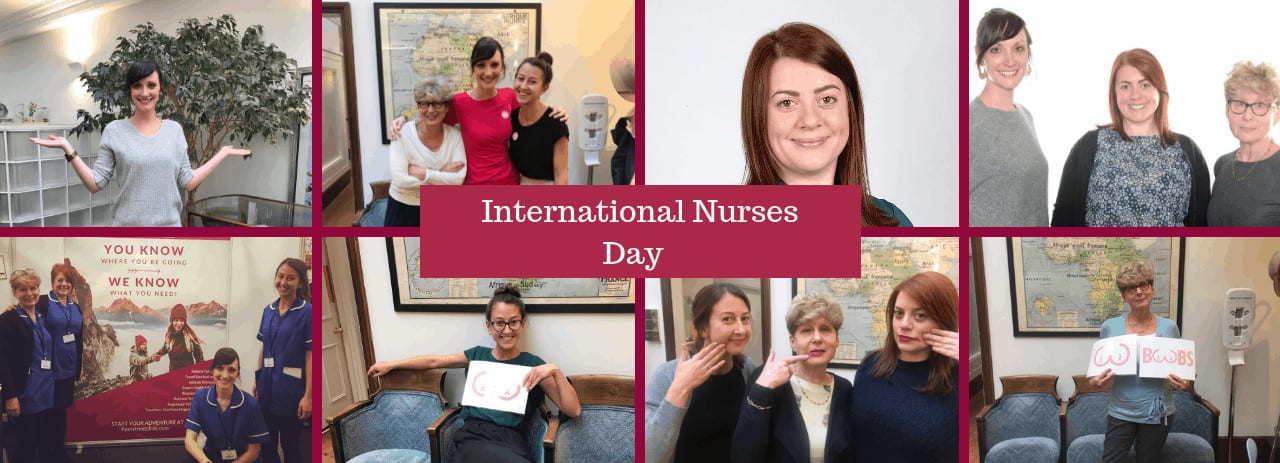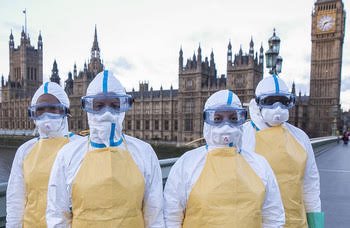Tag: Travel Nurse
If caught and symptoms develop, rabies is almost invariably fatal.
Rabies is spread through the saliva of an infected animal and is present in over 150 countries worldwide. Up to 100 children die each day from rabies, and more than 55,000 people a year are killed from the disease, mainly in Asia and Africa.
If bitten or scratched by an infected animal you need to act quickly. Your pre-exposure vaccines simplify medical care in case of a potential rabies exposure, reducing the number of post-exposure vaccine doses needed and providing more time to seek medical care because your antibodies will start to respond. This is crucial when traveling to remote areas with limited access to medical facilities.
If you haven’t had pre-travel vaccinations, the treatment is much more complicated; it is also expensive and can be hard to access in lower income countries. If treatment is given correctly and promptly after exposure, it is 100% preventable.
It is extremely important that if you are travelling somewhere with a known risks of rabies it only seems sensible to protect yourself against it. Rabies is a vaccine-preventable disease, so make sure you get vaccinated before you travel.
For more information on rabies and travel health, visit our rabies page here.
The Fleet Street Clinic is passionate about travel. We have provided rabies vaccinations for over 20 years. Our team of expert travel medical professionals provide advice and detailed consultations to ensure you have a healthy trip.
You can book a travel consultation or rabies vaccination appointment online.
Travel nurse Anna takes us on a journey to Tel Aviv. A city on Israel’s Mediterranean coast steeped in history and a vibrant cultural scene. From vaccinations to sun protection follow the top tips to travel safely.
Vaccines
All travellers are advised to ensure that they are in date with their routine vaccinations. Measles outbreaks have been reported in Israel since September 2018, and there are concerns that the increase of travellers heading to Israel for Passover in mid-April could see cases rise. Travellers should ensure that they have received two doses of measles vaccination (often referred to as the MMR) prior to departure.
Other travel vaccinations to be considered are diphtheria, tetanus and polio, and Hepatitis A. Some travellers may also wish to consider vaccinations against Hepatitis B and Rabies. It is always best to discuss which vaccinations are necessary for your trip with a travel nurse.
However, vaccinations cannot protect you from many diseases and dangers in Israel, the risk can be reduced through your behaviours…
Sun
Israel lies within the sub-tropical region with a Mediterranean climate. Summer temperatures can reach 40 degrees Celsius, and even higher in the Negev desert. Don’t let the Mediterranean summer breezes deceive you and stay sun safe. Keep hydrated, wear a high factor sunscreen and avoid the suns rays between 11am-3pm when at its strongest.
Food and Water
Israel is foodie heaven but travellers should still maintain good food and water practices to avoid tummy trouble whilst away. Avoid tap water and ice made from tap water: stick to bottled water. Ensure you wash your hands thoroughly before eating and after using the toilet. Ensure all food you eat is cooked thoroughly and served straight to you. For those who would still like the freedom to eat and drink without worry, it is advisable to carry a gastro kit with you. Inside will be various medications that can assist with travellers’ diarrhoea, should it occur.
Insects
Mosquitoes and sand flies can be particularly problematic during the summer months. Not only can their bites cause irritation, but they can also spread diseases such as West Nile Fever, dengue fever and leishmaniasis. There are no specific vaccinations and preventative treatments for these diseases, and bite avoidance is the only way. Try and cover up especially between dusk and dawn, and wear a good insect repellant that contains at least 50% DEET.
See our Ultimate Bug Kit.
From Red to Dead…
From the riches of the coral seas in the red to the abyss of the dead sea, take sensible precautions when taking the plunge. The dead sea lies 413m below sea level and is actually rather tricky to swim in. Tourist usually come to float on its surface as the high salt content makes it hard to submerge. Be careful. Cover any cuts you have with waterproof plasters to avoid a sharp sting. Do not splash when in the water, as it may cause injury or irritation to your eye if it enters. If you wear contact lenses, it’s best to swap to your glasses.
You can book all vaccination appointments or travel consultations online.
By Anna Chapman | Travel Nurse | May 2019
We’re celebrating International Nurses’ Day with stories from our wonderful nurses about why they became a nurse.
Each one of them has a special story to share as to why they chose to become a nurse. We are so fortunate to have them working here at the Fleet Street Clinic. We’re celebrating who they are and all the incredible work they do for their patients on a daily basis.

I trained as a nurse in 2013 at City University based at Bart’s Hospital, London. After working for two years in sexual health, I undertook a Diploma in Tropical Nursing at the University of Liverpool. I have always had an interest in infectious and tropical diseases, and a huge passion for travel. After volunteering in Ecuador and Kenya, I completed a masters in Nursing with my research based in Bolivia. Working overseas exposed me to the burden of tropical diseases in other areas of the world, and travel medicine seemed to be a good fit for me.
I am able to educate patients about healthy travel and how to prevent tropical diseases. I also love to travel. It is really rewarding to be able to give someone good advice about a destination when you have visited. No consultation is the same, and I love the variety of people I see. In one day I have helped people prepare for deployment in a humanitarian crisis, a couple backpacking around the world, a family moving abroad, and television crew working in remote settings.
I have gained a formal qualification in travel medicine, and have also diversified my practice to incorporate Occupational Health as part of my remit. My role is rather a niche and unique in the nursing field but I wouldn’t have it any other way.

I began my nursing career after returning from a life-changing gap year in Australia. After working as a health care assistant at a brain injury hospital, where the majority of my family have worked in at one point in time, I decided to pursue a career in nursing. I enjoy building relationships with the patients and meeting new people. After qualifying in 2013, I moved to Bristol where I worked in the cardiology ward and admissions department. I was also a bank nurse, which involved me working different shifts on various departments around the hospital. I gained a breadth of experience in all fields.
One of the most memorable moments as a nurse was on an incredibly stressful night shift. I was a Junior Nurse. A patient left me a plate of strawberries and a note which said ‘You’re doing amazingly. Well done- you are a great nurse’. I will never forget those kind words and the confidence boost it gave me to get through the night.
I joined Fleet Street Clinic in January 2018 and haven’t looked back since. My passion for travel and nursing work brilliantly in my role as a travel nurse. I have also had the opportunity to further my skills by completing a qualification in Travel Health.
I love working at Fleet Street Clinic, it really is the perfect job.

I grew up in Brighton and had a passion for science and communicating with different people, so nursing seemed the best fit for me. I moved to London to train and qualify as a registered nurse at St Mary’s Hospital in Paddington. I was appointed Staff Nurse at St Mary’s where I gained a wealth of knowledge and experience working in the ‘Casualty’ department which is now known as A+E. I later moved on to St Thomas’s Hospital where I was appointed Senior Staff Nurse and later Senior Sister on a medical ward.
I took a break from my nursing career to have my two children. Soon after I was back working in GP practices as a ‘Treatment Room’ Nurse, which is now known as a Practice Nurse. I gained many skills and loved working with the patients and forming lasting relationships and friendships.
After 42 years working for the NHS, I decided to retire and hang up my nurse’s hat. However, when I saw the job at The Fleet Street Clinic I decided that I had areas of expertise I did not want to let go. I joined in April 2018 and have been working here for just over a year. I love the buzz of working at Fleet Street. I love the team and I love meeting new patients every day.
Visit our nurses at Fleet Street Clinic. Contact us today.
Travel Clinic nurse, Lucy Mildren, has been awarded the International Society of Travel Medicine’s Certificate in Travel Health.
We’re happy to announce another of our travel nurses, Lucy, has obtained the International Society of Travel Medicine (ISTM) Certificate of Knowledge.
The ISTM Certificate of Knowledge is an examination that proves an individual has demonstrated the expertise in the travel profession and a solid knowledge of travel medicine care and consultation. The exam is held in a different location annually, Lucy attended the Atlanta examination earlier this year.
The field of travel medicine has grown dramatically over the years, as greater numbers of people travel to remote and exotic destinations. Almost a billion travellers cross international borders annually for both work and leisure. However, research worryingly suggests that very few seek pre-travel health advice.
Fleet Street Clinic is one of the UK’s leading providers in travel medicine, vaccinations and travel advice. Knowing another member’s of the team has obtained this certification in travel health provides greater confidence to the public and patients we treat that our experience and knowledge is all-around exceptional.
Travel medicine has become increasingly complex due to a number of reasons, such as increased drug resistance, global migration patterns and the rise in travellers with chronic health conditions.
Congratulations Lucy, from us all at Fleet Street Clinic.
Book your Travel Vaccines Today
For more information about the Certificate of Knowledge from ISTM website
Travel Vaccines are a key component of pre-travel preparation.
If you would like to speak to Lucy or another of our travel nurses prior to travelling, you can book an appointment online.
With Ebola remaining a cause for concern in the Democratic Republic of Congo (DRC), Johanna, one of our travel nurses who’s had first-hand experience during the 2014 outbreak, looks at the differences between the current outbreak compared to her experience.
During the 2014 outbreak, I was stationed in an Ebola treatment centre in Sierra Leone. The UK government responded to the Ebola outbreak by sending out British medical professionals to help support the Ebola response unit. It was a time in my life when I didn’t have responsibilities that tied me to a fixed geographic location, alongside having the necessary skills that could make a difference, so there really didn’t seem a reason not to go to help out.
The current outbreak is happening in the Democratic Republic of the Congo (DRC).
The General-Director of the World Health Organisation recently visited Ebola-affected areas in the DRC and reported:
‘Since the outbreak began in August 2018, there have been 608 cases and 368 deaths in North Kivu and Ituri provinces. To date, more than 54,000 high-risk contacts and frontline responders have been vaccinated, and almost every new patient receives one of four investigational treatments, something which was never previously possible during an Ebola outbreak.
The main challenges are the security environment, pockets of mistrust among affected populations, and poor infection prevention and control in many public and private health facilities. Under the government’s leadership and working collaboratively with UN and NGO partners, WHO is committed to addressing these challenges and ending the outbreak.
There are many factors that make this current outbreak vastly different to the 2014 outbreak:
- Regional Stability
The political situation in the DRC is unstable which has led to less infrastructure to support relief efforts and virus control activities. Healthcare providers may be at risk of violence which makes a difficult job even harder. Civil unrest has lead to more than 1 million people being forced to leave their homes to escape potential violence, this mass movement of people means the spread of the virus is harder to control. This creates a very different context to the one we were facing in Sierra Leone.
Source: The New England Journal of Medicine: New tools in the Ebola arsenal, United Nations High Commissioner for Refugees: Spiralling violence puts millions at risk in Ebola-hit eastern DRC. August 24, 2018
- Public Awareness
At the beginning of the 2015 outbreak, there was very limited public awareness of the Ebola virus and how it is spread. The understanding of Ebola transmission was minimal and communities were unaware that some traditional practices could be increasing the risk of infection. The outbreak in 2015 involved a very steep learning curve for all involved. The many lessons learnt then will mean that there is more knowledge, resources and information to fight the virus this time around.
According to The Lancet:
In 2016, Guinea, Liberia, and Sierra Leone succeeded in interrupting the longest epidemic of Ebola virus disease in global history…Control of the epidemic was primarily achieved by implementation of effective and coordinated public health measures that involved rapid identification, isolation of cases, contact tracing, and isolation of contacts.
Source: The Lancet: Prevention of Ebola virus disease through vaccination: where we are in 2018
- Ebola Vaccine
One of the major developments in the armoury of tools to fight Ebola is the development of an Ebola vaccine. This was only a dream in the 2015 outbreak but it is a reality for the healthcare professionals currently working in the DRC. Although still in its early stages, the Ebola vaccine in use in the DRC is showing very promising results. In May and June of 2018 more than 3,000 people were vaccinated as part of the WHO response to the Ebola virus.
Source: The Lancet: Prevention of Ebola virus disease through vaccination: where we are in 2018
- Safer working conditions
Treating patients in the 2015 outbreak was very difficult for many reasons. One of the hardest things was finding a balance between safety from infection and being able to provide effective and compassionate care. Working in the hazmat suits kept us safe from transmission of the disease, but working in 40-degree heat wrapped up in layers of plastic was very inconvenient for many reasons. Being so hot meant that we could not spend as much time with our patients as we would have liked because there were limits to how much time we could spend in the Red Zone for our own safety. Being so covered up also made it harder to form human relationships with our patients (which is the cornerstone of nursing practice) because it was difficult for our patients to distinguish between us and any chance of communication through facial expressions was impossible.
The current outbreak has seen the introduction of air-conditioned Ebola treatment cubicles which eliminates the need for such restrictive time constraints whilst also offering a healthier environment for medical professionals.
According to the New England Journal of Medicine:
With such cubicles, health care workers can provide intravenous fluids and therapeutics through specialized ports and are thus freed from the burdensome personal protective equipment used during the 2014 West African outbreak to spend more time with their patients. Medcins sans Frontieres (MSF, or Doctors without Borders) continues to be a leader in developing safe care for patients with EVD provided in structures that can be rapidly erected using local resources.
Sources: The New England Journal of Medicine: New tools in the Ebola arsenal
- Containment of the outbreak
This outbreak is considered a contained case with little spread outside of the outbreak origin. The 2015 outbreak quickly moved across international borders and therefore was a cause of much concern for the international community. People are obviously anxious about the spread of Ebola, however, at this stage, the risk is minimal within Europe. There are many precautions taken by all those returning to the UK from affected areas.
When returning from Sierre Leone, I was subject to 3-week quarantine monitored by Public Health England during which I had to report my temperature to them twice a day and there were numerous restrictions on what I could and couldn’t do such as, I couldn’t work in hospitals, I could get my hair cut but not shaved, I couldn’t get a pedicure nor go to places with large amounts of people including football matches and music concerts. Everything was extremely well monitored and the public was kept incredibly safe from infection. These practices are no-doubt to be in place for this current outbreak as well.
______________________________
If you have any concerns about travelling to parts of Africa, you can book a travel consultation for the latest travel health advice for your destination.
By Johanna Bosowski | Travel Nurse | February 2019








